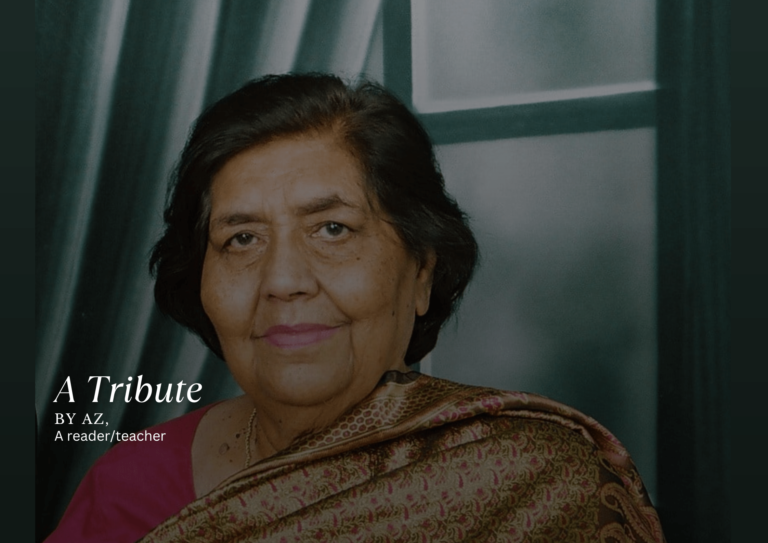By: AZ a reader/teacher
There’s usually one person for everyone who acts as an agent of change, setting the trajectory of their life on an enlightened path. For me, that person was my English teacher, Mrs. Rahila Masood, during my senior school years. It was our good fortune that Cambridge offered a choice of “Classics in Translation,” alongside Literature and Language, in Karachi schools. Even more fortunate was having Mrs. Masood (Mrs. M) as our teacher for all three subjects.
Having heard rumours of Mrs. M’s candid, satirical remarks and humor, we entered her class with trepidation. As a group of 14 to 15-year-olds with little finesse and a rudimentary knowledge of Greek and Roman myths, our apprehensions were high. However, ten minutes later, we were immersed in the world of Homer, the blind bard who crafted The Odyssey. Entranced by the tale of Odysseus’ journey, the tribulations faced by his wife Penelope, and the struggles of his son Telemachus, we were startled when the bell signaling the end of our double period rang. We left the world of mythology reluctantly.
My journey into classics, mythology, folklore, and literature had begun. I had always loved reading, but under Mrs. M’s tutelage, it became a passion. With her, we explored Greek and Roman writers like Ovid and Euripides, and discovered Aristotle, Sophocles, and many others. It became a contest to see who would find a book first and bring it to class. We learned to give references from other writers in our answers to make them more interesting. The highlight of our class was the discussion of our scripts and Mrs. M’s sometimes scathing, yet constructive, criticism, laced with wit. This made us determined to do better and achieve the nearly impossible and coveted 6 out of 10.
In our A-levels, it was the same with literature. Shakespeare had never been so interesting or so easy. We slurped up the difficult language like a sugary drink. Chaucer’s Wife of Bath was a revelation—a writer from his time portraying a woman who had no qualms about choosing a sixth husband:
Yblessed be God that I have wedded fyve!
Welcome the sixte, whan that evere he shall.
For sothe I wol nat kepe me chaast in al.
Whan myn housbonde is fro the world ygon,
Som cristen man shal wedde me anon.
In this part of her Prologue, she gleefully thanks God that she has had five husbands and declares that she will happily marry the sixth after the fifth dies. In these lines, as in others, she praises marriage for its physical pleasure, barely mentioning the medieval value of chivalrous love. We spent many hours chortling over Chaucer and Shakespeare’s bawdiness and lamenting the insipid portrayal of women in their works. Mrs. M gave us the power of inference, deduction, and analysis, for which I will always remain grateful.
She dedicated her life to teaching, lived on her own terms, and founded what was probably Pakistan’s first academy for students who couldn’t get the desired quality of education in regular schools. She was an unforgettable personality and, for many like myself, a beacon of hope for those dedicated to imparting a love for literature. RIP!



